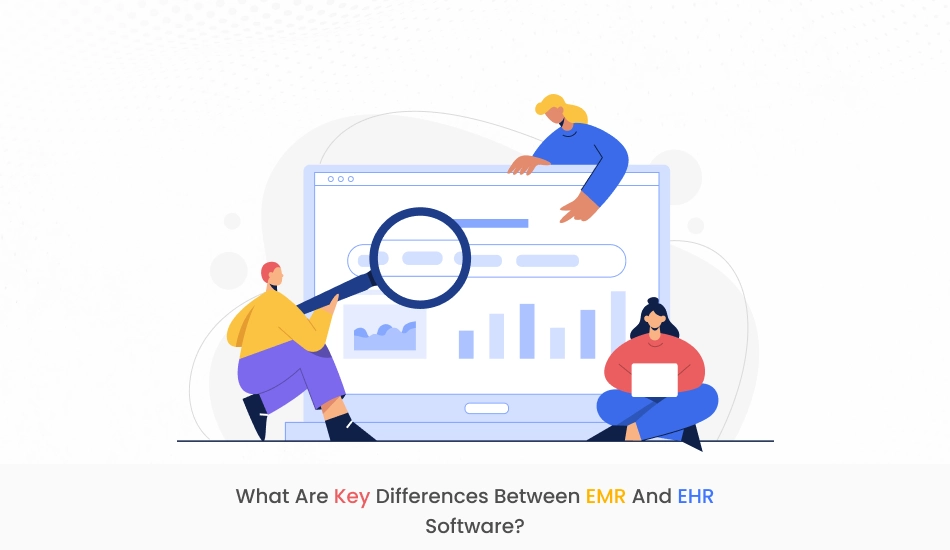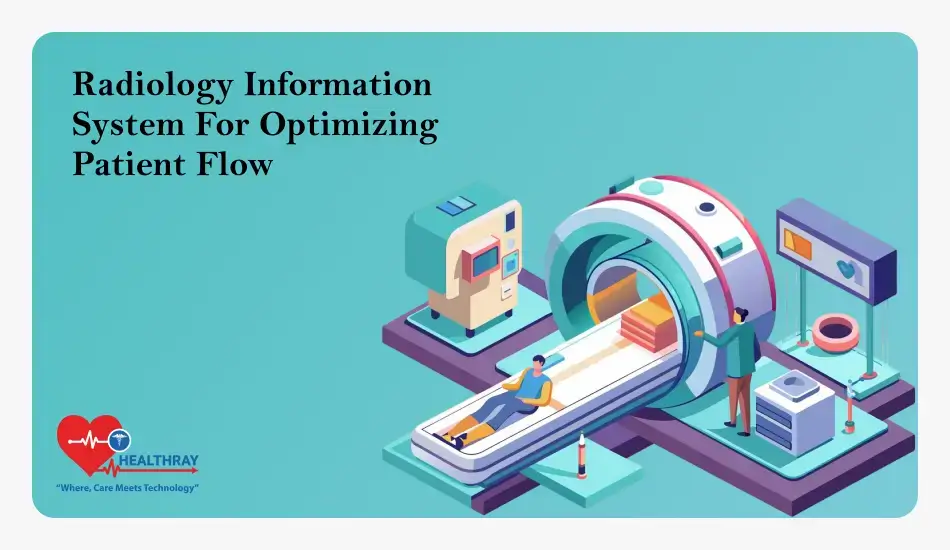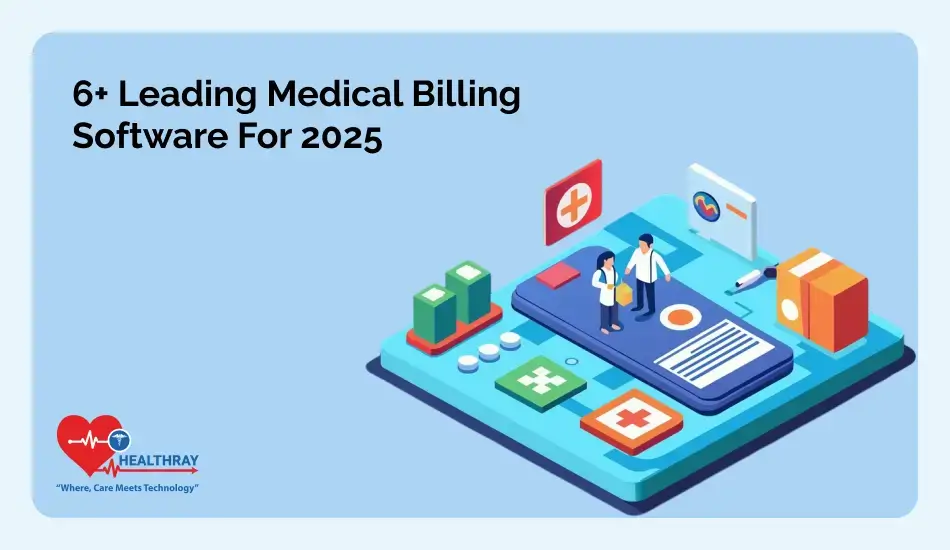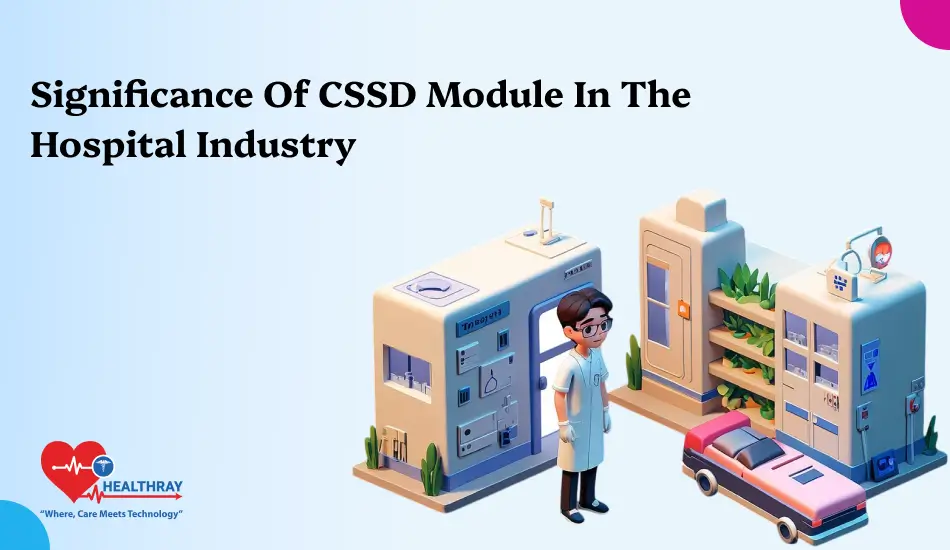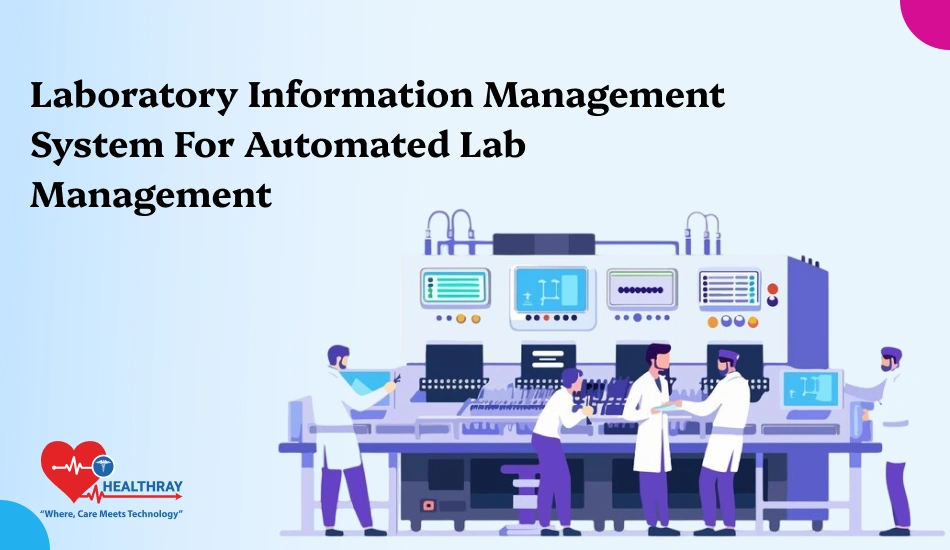Quick Summary
Whereas Electronic Health Records (EHR) offer a comprehensive viewpoint of a patient’s health history over diverse institutions, advancing improved coordination and continuity of care, Electronic Medical Records (EMR) concentrate on personal patient health records inside one healthcare organization. Hence lets discuss briefly about EMR and EHR Software.
Introduction
Electronic medical records (EMR) and electronic health records (EHR) both came into existence in 1992 to enhance the efficiency of medical treatments. Evicting paper-based records was a great decision in the healthcare industry, but it has left many confused. People need clarification on EMR Software and EHR, and they have confusion regarding their features and uses.
According to a report, 72% of physicians used electronic health records in 2019, which increased to 78% by 2023. EHRs and EMRs are digital versions of the patient’s medical history. Many people tend to use Electronic Medical Records (EMR/EHR) Solution interchangeably. However, be aware that both of these terms have specific differences that you should take note of.
Hence, to clear out confusion at a greater level, here’s your helping hand. In this guide, we will help you discover the differences between electronic medical records and electronic health records. Along with their differences, you will get to understand the advantages, disadvantages, and much more regarding these software solutions. We have brainstormed this topic and gathered details to clear out your confusion. Let’s start by seeking an answer to this exploring debate between EMR and EHR Software!
What are electronic medical records?
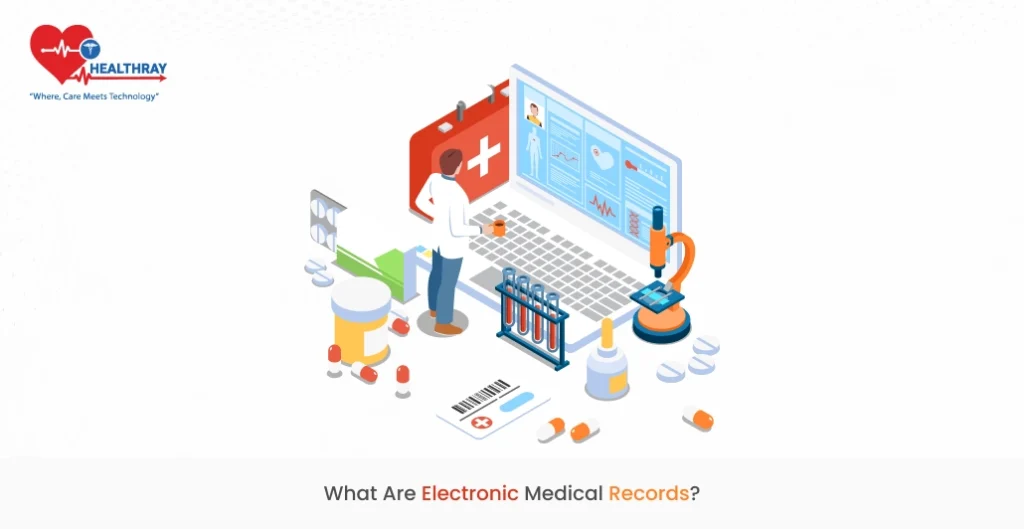
Electronic medical records function as an electronic version of the patient’s medical history, diagnosis, and treatment plans. All of this information is available to multiple parties across the organization. Hence, it can reduce paperwork and enhance accessibility across care teams. Also, EMRs can add to the accuracy of records by eliminating human errors and strengthening collaboration among providers. EMR systems, in correlation with digital transformation, can provide plenty of advantages, such as reducing paperwork while increasing collaboration to maintain accuracy.
Administer the clinical documents systematically along with applying guidelines. Create financial strategies through the better management of cash flow. Moreover, it combines a variety of details and converts into a creative visual report. The EMR and EHR software aids to inventory planning, analyzing information, improving data quality, managing expenses, and making informed decisions quickly.
EMR plays a critical role in enhancing and improving the quality and safety of people visiting the healthcare institution. It gives providers complete access to patients’ healthcare data and previous records. Hence, they can continue making diagnoses and treatment decisions in an informed manner. Also, it can help them share data easily with other team members.
The electronic medical records software interchanges information, builds a great community of healthcare experts, monitoring information at any time, and increases clinical efficiency. Furthermore, it examines the patterns of medical images and helps in patients’ diagnosis, enhances data quality, drafts electronic prescriptions, and constructs diverse design templates. Therefore, the EMR software controls data, facilitates exciting attributes, improves administrative procedure, and enhances medical outcomes.
In the end, it improves coordination, participation, and communication among care groups. These systems, moreover, streamline regulatory procedures and cut down on printed material. It is saving time and cash in the process of gathering information on population health to spot patterns that guide public health policy choices.
What are electronic health records?
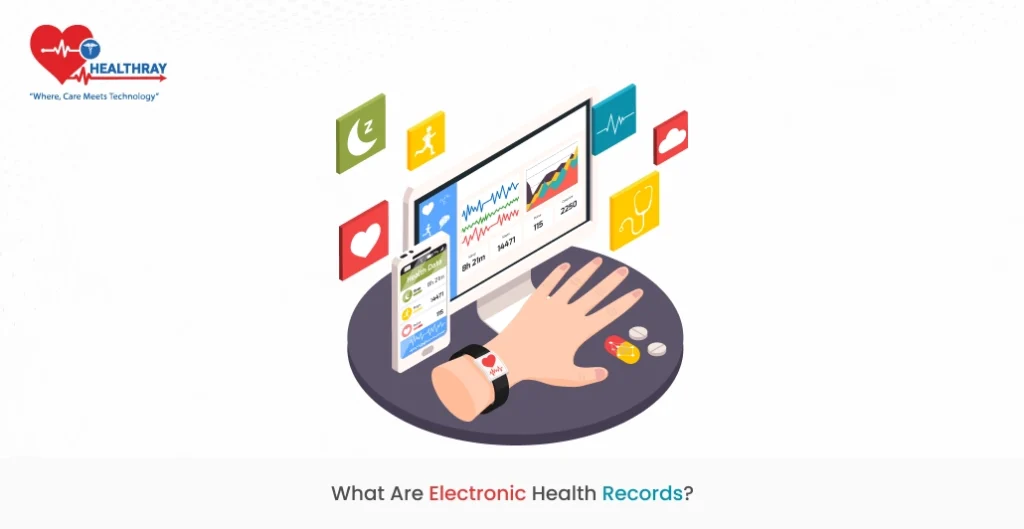
Electronic Medical Records (EMRs) offer digital forms of patient medical histories and healthcare information that are customized for routine order input, billing, and appointment scheduling duties. Writing medicines, putting test orders, and recording patient visits are just a few of the many responsibilities that electronic health records software is utilized for.
Its primary purpose is to help doctors manage patients more effectively and efficiently when providing care. EMR and EHR Software are not the same thing. EMRs are intended only for doctors’ use. Electronic health record systems also encourage access sharing between different healthcare providers and organizations, making supplier coordination superior.
Maintain the patient data including appointment history, sensitive information, medical reports, and medical images. Furthermore, it improves administrative operations such as accumulating funds, preparing systematized receipts, supply chain management, and administering clinical resources. Additionally, it embeds with the superior tools such as reminders, integration, and effective scheduling system.
Assimilation of clinical documents, categorizing in the better format, and examining through visual reports. Make it easier to search any medical documents from anywhere. Moreover, the electronic health records simplify to have coordination with different hospital branches with a single healthcare software. Additionally, the electronic health records system streamlines access to documents, shares healthcare knowledge, and predicts health outcomes easily.
Therefore, the EHR software creates a digital environment that substantially mitigates errors, improves data quality, augments diagnosis efficiency, and decreases average expenses. With the help of an EMR and EHR Software, clinicians can obtain a patient’s complete medical history and make an exact diagnosis.
Here, they have a complete 360-degree picture of the patient, from which they may choose. They also take preventive action sooner when they are mindful of everything beforehand. A more noteworthy dependence on innovation is reducing the scope of manual mistakes. Subsequently, bright future times are ahead.
Since an EHR is required for extra features and capabilities like data mining, predictive analytics, and population well-being management, the improvement costs of EHRs are frequently higher than those of EMRs. EMR costs often extend from a few thousand dollars to millions of dollars, depending on the size and complexity of the project in terms of development expenditures.
EMR Vs. EHR: Advantages
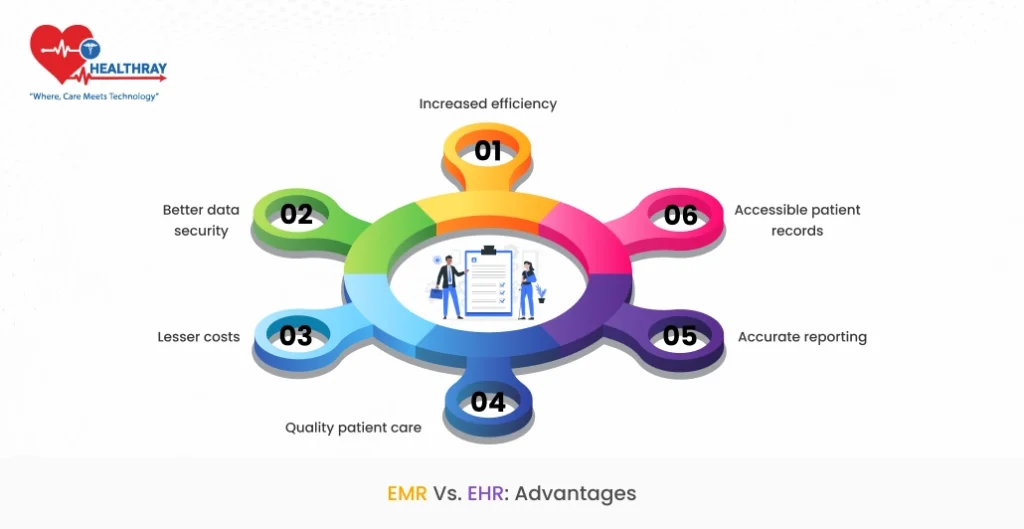
Here’s a list of advantages of EMR:
Increased efficiency
By mechanizing data entry and other authoritative activities, electronic medical record (EMR) software makes a difference in medical practices, becomes more productive and frees up more time for patient care. Electronic health record software makes patient records rapidly and promptly available. So that medical experts can quickly get the precise data required for way better healthcare conveyance
Better data security
Improved information security measures are taken to secure patient data from unauthorized access and provide patients and suppliers with peace of mind. Hence, strict security measures and encryption innovations can help avoid any complications. It is necessary to ensure the privacy of sensitive data is maintained.
Step towards digital era with our healthcare solution
Revamp your hospital facilities and embrace change for better healthcare management. Ease in managing and organizing large medical datasets leads to effective analysis. Seize the opportunity now!
Lesser costs
Diminished Costs may help cut regulatory costs for healthcare providers. It does so by substituting electronic procedures for paper-based ones, lowering the cost of transcribing administrations. Paper records can double the costs a provider might have to spend on maintaining them.
Quality patient care
EMR frameworks provide medical experts with precise patient records that support accurate determination and treatment choices. They moreover encourage information exchange among individuals of a provider’s care team, cultivating superior collaboration and communication. Eventually, the ultimate aim of any healthcare technology is to improve the quality of care.
Accurate reporting
Thanks to EMRs, healthcare experts can more effectively assemble and assess population health information. They help recognize patterns that advise public health decision-making, improving healthcare results and bringing down framework costs. In conclusion, they may offer assistance with total cost savings as well as superior care conveyance.
Accessible patient records
Electronic Patient Management System encourages consistent healthcare coordination between healthcare organizations and suppliers by granting access to entire patient records from any area. Another advantage is that patients may now more easily access their data thanks to EHR software.
Here’s a list of advantages of EMR:
Adding to patient care
Healthcare experts can access essential patient information more quickly with the use of electronic well-being records, resulting in more precise diagnosis and treatment planning. They can also follow patients as they advance toward long-term care or recovery from chronic illnesses.
Looking after data protection
Electronic health records offer improved security for information transmission and capacity compared to paper records. Before being kept electronically, patient information is encrypted to give an extra layer of protection against unlawful access or data breaches. Utilizing EHR systems, healthcare educators can monitor exercises to guarantee that only authorized people access patient records.
Better cost savings
When compared to paper data, electronic health records (EHRs) offer healthcare organizations noteworthy cost savings in terms of printing, capacity, and recovery costs, as well as better provider coordination. Healthcare organizations result in lesser unnecessary testing and medicines being given to patients, as well as better productivity in the utilization of assets.
Great access and mobility
EHRs grant medical experts more portability and accessibility. By actualizing an EHR framework, healthcare experts can access patient information from any area with internet access. When care is necessary, they streamline the process. Furthermore, they may examine patient records while on the go and update them as necessary to guarantee that their patients receive care on time, thanks to versatile gadgets like smartphones.
Better patient satisfaction
EMR Systems also help patients by encouraging quicker and less demanding access to healthcare experts and communication with them. With an EHR system in place, patients can look at their medical records more rapidly and communicate real-time overhauls to clinicians, resulting in faster processes for determination and treatment. Not to mention being able to view test findings and medicine alterations for bespoke software development services without having to wait for calls or in-person visits!
EMR and EHR Software: Disadvantages
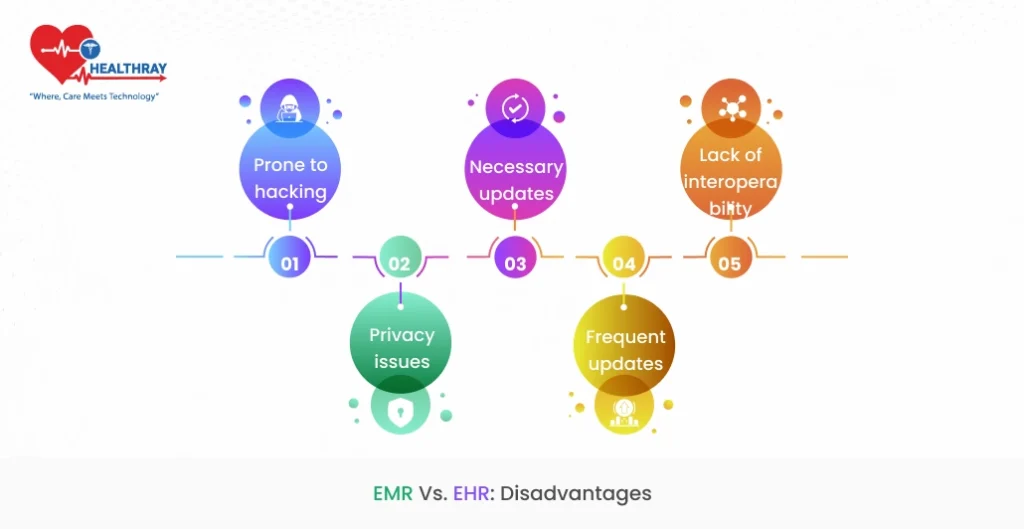
Prone to hacking
There have been plenty of cases in which patients’ medical records got harm due to hacking. This issue was faced in 2017 by plenty of healthcare providers as hackers got access to systems and stole their data. Hence, you must be careful when choosing an EMR provider. Choose a provider like Healthray that has the best security measures.
Necessary updates
If there is any small clinic owner or a lower-level practitioner, they might have been employing the same EMR system for years. Hence, it can be necessary for them to keep their tool updated with the latest technology. If not, then you might have to face vulnerabilities. But you can surpass this limitation of EMR by updating it on a regular basis.
Lack of interoperability
There are plenty of different platforms that healthcare providers have to manage. Hence, hospitals must choose EMR and EHR Software that integrates with other systems, such as hospital management systems. Moreover, to avoid this disadvantage, select a provider that has the best integration capabilities with other systems.
Here is a list of disadvantages of EHR
Privacy issues
Although data is safe with Electronic Medical Record Software, there are certain cases in which there are security breaches as hackers try to gain access to patient data. These cases can only happen when organizations don’t use certified systems. Hence, it is necessary for healthcare providers to remain alert and maintain the highest level of security. Choose a provider that provides exceptional security measures.
High maintenance costs
Although using EHRs is very advantageous, there are specific financial challenges associated with it, such as significant upfront expenses, regular technology maintenance, costly technology implementation, switching from a traditional to an eHealth strategy, and more. It explains why certain healthcare professionals only sometimes favour EHR systems.
Frequent updates
Hospitals must keep their systems up to date in accordance with their partners’ electronic health record systems when they use an EMR and EHR Software and have partnered with other healthcare providers, such as pharmacists and personal trainers, to ensure that they don’t overlook important information regarding patient appointments and reports. This regular upgrading might be a laborious process.
EMR and EHR Software: Main Differences
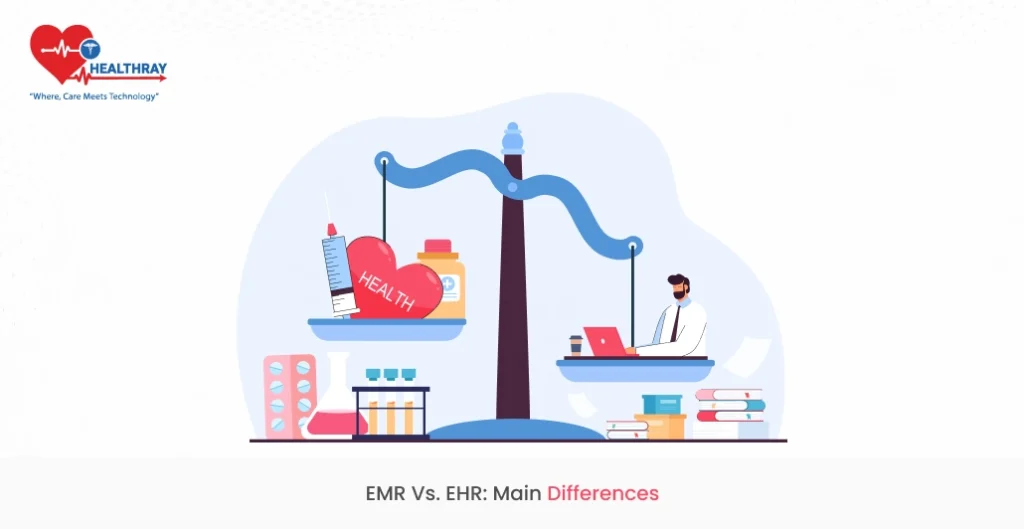
It is certainly easier to understand the difference between EMR and EHR Software if you know the difference between medical versus health. An EMR provides a more condensed perspective of a patient’s medical history, whereas an EHR provides a more thorough report of the patient’s general health. Here’s a quick comparison between both:
| Aspect | EHR (Electronic Health Records) | EMR (Electronic Medical Records) |
|---|---|---|
| Scope | Lays emphasis on patient records within the organization | Offers a complete view of patient’s health across various healthcare providers by collecting data from multiple sources |
| Interoperability | Limited interoperability, mostly within the system | Offers great interoperability, providing data exchange between healthcare providers |
| Data Sharing | Primary sharing of information among the staff | Facilitates sharing of patient data and history among different organizations and providers |
| Continuity of care | Availability of patient record within healthcare facility | Enhances the level of continuity of care by making patient records available across institution |
| Accessibility | Accessible to person having authority within organization | Accessible to authorized people among and across the healthcare organizations |
| Data integration | Focuses on managing clinical data within healthcare system | Includes different types of data such as clinical, administrative and financial |
Conclusion
Since they each have extraordinary benefits, electronic medical records, or EMRs, and electronic health records, or EHRs, are beneficial for healthcare professionals. Some hospitals combine both of these strategies for therapeutic practice. However, it depends upon the company’s needs.
Clinics and bigger healthcare provider groups use EHRs regularly since they can give a total picture of a patient’s health. In addition, EHRs help companies in creating a personalized health plan for each patient and in tracking that patient’s data over time. On the other hand, personal practices make use of EMRs. EMR systems can give the most helpful means of gathering and storing patient information. It makes overseeing medical histories and performing clinical obligations simpler for both patients and healthcare experts.
Are you looking for an EMR and EHR Software for your healthcare organization? You’re in the right place! Healthray is a prominent and leading provider of both EHR and EMR systems in the healthcare industry. Our AI-powered EMR/EHR system is known to surpass the expectations of medical specialists in the field. We have intuitive, sensitive, and secure EHR and EMR systems that can be an asset to your organization.
